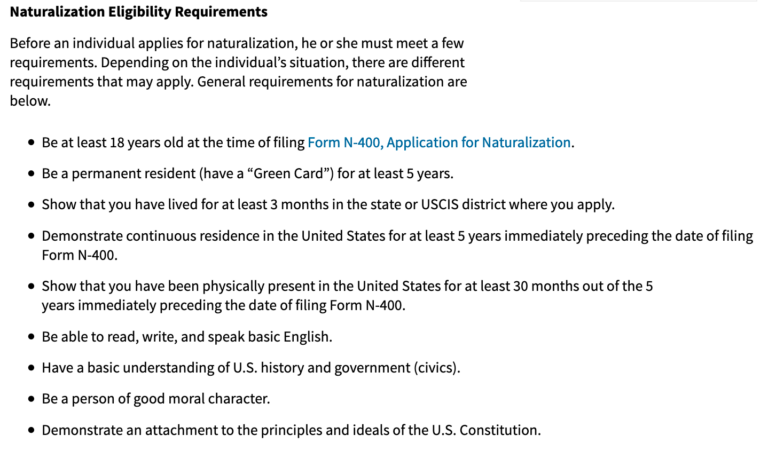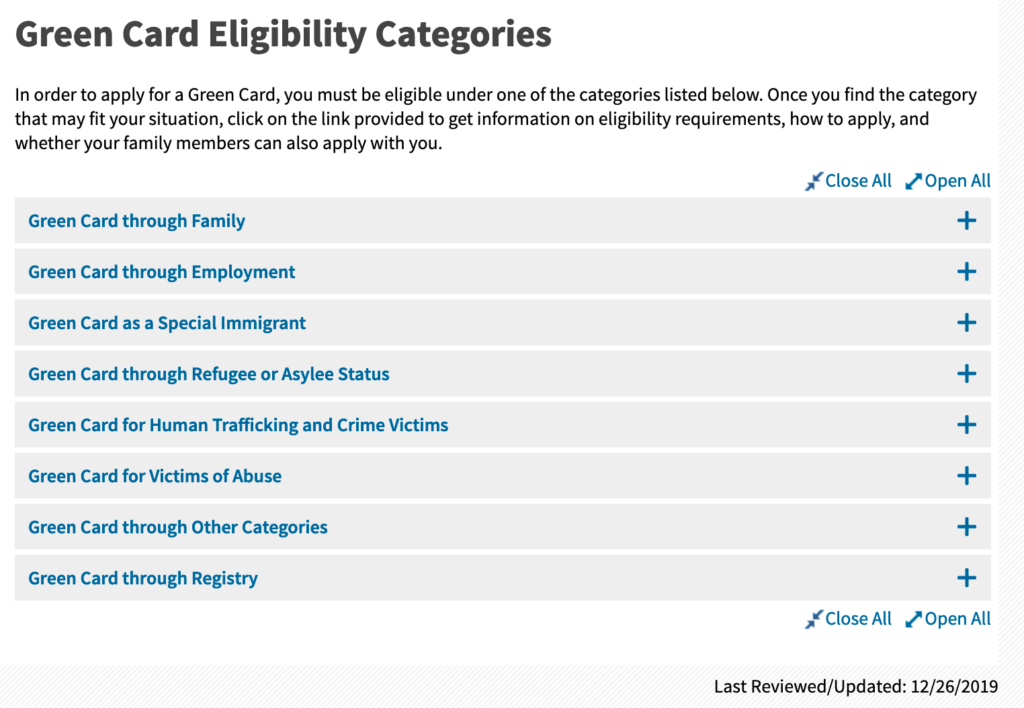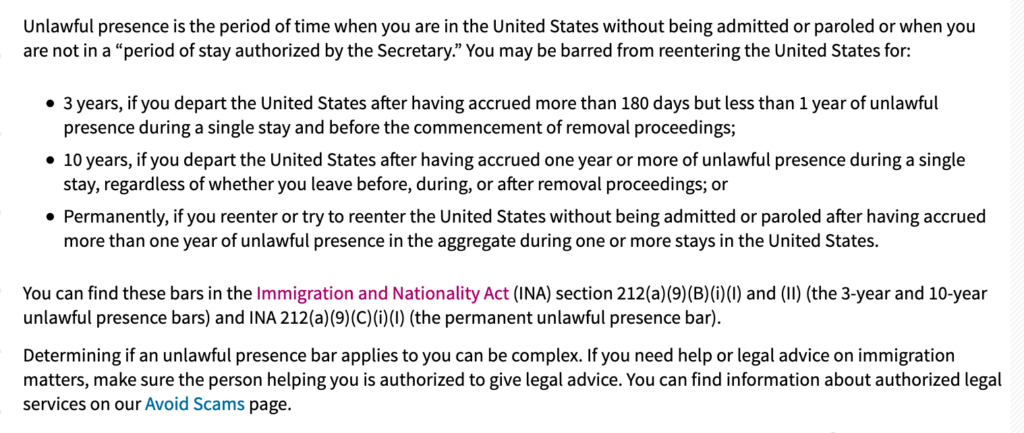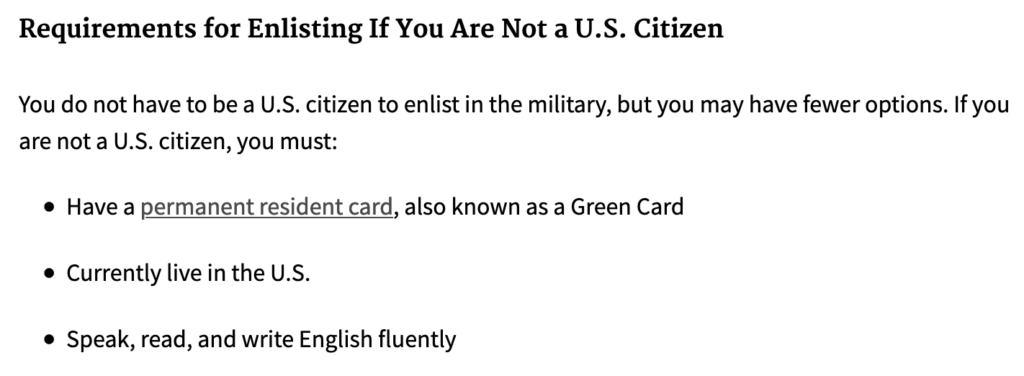11 min read

Why Haven’t I Applied for Citizenship Yet?
- Intro
- Green Card Eligibility
- My Pathways to Citizenship
- Citizenship through Marriage to a US Citizen
- Citizenship through Military Service
- Thank You
Intro
UPDATE: Thanks to so many that have connected with me after sharing my Facebook post: My Harsh Reality and +700,000 Others. I want to give a shout out to Juan Zapata for sharing his great article that is similar to my explanation here but from an outsider applying to the US for a Visa: Why Don’t All These Damn Illegals Come in the Right Way
After my recent post on Facebook I received a lot of questions around why I haven’t “simply” just applied to get citizenship. Citizenship meaning naturalization. The requirements are nicely listed on USCIS’ website as follows:

If you pay close attention to the second bullet, that’s what bars me from applying for citizenship. Your next question is probably, why haven’t you become a permanent resident? Well, I have been a “permanent resident” to my understanding (I’ve lived in the US for 21 years now) but permanent resident means having a Green Card.
Green Card Eligibility
Unfortunately to get a Green Card there are no ways for me to do so at this point in time. Requirements to get one are listed on USCIS’ site as well:

The two categories I personally could fall under would be the first two; through family or through employment. The first one, I don’t currently have an immediate relative that is a US Citizen or Green Card holder. The second one would be perfect since I work as a software engineer but in the eligibility to adjust to Green Card it states:
The status of an alien who was inspected and admitted or paroled into the United States or the status of any other alien having an approved petition for classification as a VAWA self-petitioner may be adjusted by the Attorney General, in his discretion and under such regulations as he may prescribe, to that of an alien lawfully admitted for permanent residence if (1) the alien makes an application for such adjustment, (2) the alien is eligible to receive an immigrant visa and is admissible to the United States for permanent residence, and (3) an immigrant visa is immediately available to him at the time his application is filed.
In the first sentence, “…admitted or paroled…” it voids the possibility of me applying this way. I was not brought into this country in any way that admitted or paroled me into the U.S. You can read further about how I was brought here in my Origin Story series: The Past Part 1.
As a side note, average time for a Green Card application is from 7 to 33 months.
My Pathways to Citizenship
Alright, now that we have established the “simply” apply for citizenship statement you may be wondering, or not, what are my possible pathways? One, I could leave the US and apply from outside of the country. While this would be “the right way” to do it, it would require that I wait anywhere from 7 (best scenario) to 33 months on average for a Green Card application to go through. This would be outside of the country I’ve learned to navigate. Sending me to another country without the possibility of easily coming back to a place I know is frightening to me. If you have the bravery to take that leap of faith more power to you.
Why am I afraid? My parents went about 20 years without being able to see their parents. I love my parents, I can’t imagine going more than a year without being able to see them. Their hugs mean the world to me and I’m afraid of not having that.
Another possible avenue that I have been suggested to take is marrying a U.S. citizen. As it stands you saw how complicated the Green Card process can be, now add on marrying a citizen spontaneously. I don’t know about you but I (I may be a hopeless romantic) want a marriage to be meaningful. Add on the fact that the person I choose to marry should be fully aware of my situation and be okay with what it means to marry me. Would they want a honeymoon abroad? Can’t do that because I can’t leave the country. Would they want me to vote? Can’t do that because I can’t without committing fraud. The list can go on and on. As DACA exists today I can only guarantee them that I’ll be able to carry my own weight for the next two years. After that, it’s up in the air what could happen to me.
Here is an article that is an Op-Ed but elaborates on the challenges of marrying an undocumented individual very well: Fear and Romance for People without Papers
Citizenship through Marriage to a US Citizen
Okay, let’ s pretend I find someone that is okay with all of that, because, you know, love overcomes all borders (pun intended). What’s the process for ME (again talking about one single case, mine specifically) to get a Green Card through marrying a U.S. citizen.
I am still barred from applying straight to the Green Card because I was not “…admitted or paroled…” into this country. What does that mean then? I would have to leave the country to reenter back under the new lawful entry status.
For some the option to leave and reenter is not plausible. See the following from USCIS’ website:

Leaving will lead to a minimum 3 year ban if you accrued any unlawful presence. When does unlawful presence begin to accrue? Right at the great age of 18. You can find this information on the same page the image above came from.
The good thing for me is that thanks to DACA I didn’t personally accrue unlawful presence. If you applied to DACA before the age of 18 you were protected from accruing unlawful presence. Unfortunately, many were already over the age of 18 when DACA was enacted. You had to have not been older than the age of 30 on June 15, 2012. This means that anyone that was older than 18 and a half would have triggered the minimum 3 year bar.
Another way some individuals that received DACA have accrued unlawful presence is by letting their DACA expire because they didn’t have the funds to reapply on time for a renewal or their renewal taking longer than expected to process so they receive it after their expiration date and that causes unlawful presence to be accrued.
Looping back around to my situation. I don’t have unlawful presence accrued so I’m all set right? Well, currently I have no path forward as I’ve mentioned so far but if I do get married I at least won’t be barred from reentering the country when I do pursue fixing my status.
There are quite a few additional stipulations if I were to pursue a path to citizenship through marriage. You have to prove a good faith marriage that is interpreted by USCIS. See more information about that here: USCIS Good Faith Marriage.
Citizenship Through Military Service
I’ve left the military pathway for last as it is the most convoluted to me. Let’s look at what a military pathway to citizenship could be like:

Well, the first bullet immedietely bars me from even enlisting to the military. Bummer. Let’s assume I had managed to enlist by having had a Green Card and now I was going to apply for citizenship. The eligibility to apply for naturalization is as follows:

Okay, great! All I need to do is meet all of the requirements of either section 328 or 329 of the Immigration and Nationality Act of 1965 (INA).
This block quote comes from section 328 of the INA.
No person, except as otherwise provided in this subchapter, shall be naturalized unless such applicant, (1) immediately preceding the date of filing his application for naturalization has resided continuously, after being lawfully admitted for permanent residence, within the United States for at least five years and during the five years immediately preceding the date of filing his application has been physically present therein for periods totaling at least half of that time, and who has resided within the State or within the district of the Service in the United States in which the applicant filed the application for at least three months, (2) has resided continuously within the United States from the date of the application up to the time of admission to citizenship, and (3) during all the periods referred to in this subsection has been and still is a person of good moral character, attached to the principles of the Constitution of the United States, and well disposed to the good order and happiness of the United States.
The first sentence makes me ineligible, “…being lawfully admitted for permanent residence…” Let’s try section 329 of the INA:
Any person who, while an alien or a noncitizen national of the United States, has served honorably as a member of the Selected Reserve of the Ready Reserve or in an active-duty status in the military, air, or naval forces of the United States during either World War I or during a period beginning September 1, 1939, and ending December 31, 1946, or during a period beginning June 25, 1950, and ending July 1, 1955, or during a period beginning February 28, 1961, and ending on a date designated by the President by Executive order as of the date of termination of the Vietnam hostilities, or thereafter during any other period which the President by Executive order shall designate as a period in which Armed Forces of the United States are or were engaged in military operations involving armed conflict with a hostile foreign force, and who, if separated from such service, was separated under honorable conditions, may be naturalized as provided in this section if (1) at the time of enlistment, reenlistment, extension of enlistment, or induction such person shall have been in the United States, the Canal Zone, American Samoa, or Swains Island, or on board a public vessel owned or operated by the United States for noncommercial service, whether or not he has been lawfully admitted to the United States for permanent residence
Link to site: https://uscode.house.gov/view.xhtml?req=granuleid:USC-prelim-title8-section1440&num=0&edition=prelim
Okay, so if I served in the military during a time of hostility I could be eligible to apply for naturalization. We’ve been in a time of hostility since September 11, 2001. Reading on section 329 of the INA led me to discover the Military Accessions Vital to National Interest (MAVNI) Pilot program. I discovered that through the MAVNI program some DACA recipients were eligible to enlist in the military after MAVNI was adjusted for DACA status in October of 2014. Unfortunately, MAVNI has specific requirements to be eligible to enlist via that program and on top of that the MAVNI program has been suspended since 2017. You can read more about MAVNI here: https://dod.defense.gov/news/mavni-fact-sheet.pdf
Also, here is a story about a DACA recipient that did go through the MAVNI program: DACA Recipients Who Dream of Military Service are Stuck in Limbo
In conclusion, there is no military path for me because I can’t even enlist in the military as the law stands today. I wish I could simply have a path to citizenship through my existing merits. You can read more about what I’ve accomplished in my last post: My Harsh Reality and +700,000 Others
Thank You
If you stayed with me through all of that I can’t say thank you enough. That was a lot of information even for me to process but I hope it makes some sort of sense to you, my reader.